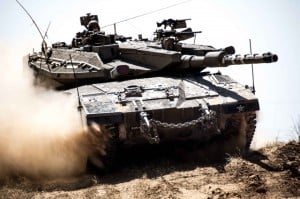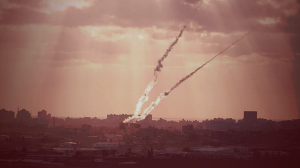After Israel’s war with Hamas in the summer, it is preparing to face a threat posed by Hezbollah in the north. What will it look like? A senior IDF officer offers some insight.

The Israeli made Merkava tank. (Photo: IDF)
The threat posed by Hezbollah to Israel in the north is far greater than that from Hamas in the south, Major-General Yair Golan warned during an interview on IDF Radio on Wednesday.
“The fierceness of the northern threat is significantly greater than the one we [Israel] encountered during Operation Protective Edge, and therefore we will probably be required to substantially more decisive actions in a much more powerful magnitude,” Golan, commander of the IDF’s northern sector, stated.
The IDF is aware of the dangers it may encounter in an eventual war with the Shi’ite terrorist group, and “is prepared and ready in a quicker, more determined and powerful fashion,” Golan added.
Hezbollah Tunnel Threat?
The question of terror tunnels running from Lebanon into Israel surfaced after the IDF’s campaign against Hamas’s network in Gaza. Relating to this threat, Golan shared that the IDF has no concrete or positive intelligence that indicates a terror tunnel threat coming from Hezbollah. However, “the situation [in the north] does not resemble the one around the Gaza Strip, but the idea of digging tunnels is not foreign to Lebanon or Hezbollah,” Golan explained, “and therefore we need to assume that that there are tunnels and that we need to search for them and be prepared.”
Golan is of the opinion that the tunnel threat is overestimated, saying, “its one of those things which presents a new operational challenge, but I think we have the proper tools [to surmount it].”
Partial Rocket Protection
Relating to Hezbollah’s dreaded fire power and rocket arsenal, Golan admitted that the IDF would not be able to provide the same outstanding aerial protection it had given the residents of the south during Operation Protective Edge. “I estimate that we will be successful in intercepting primarily the heavier rockets, and less the regular ones,” he surmised.
Golan believes that the biggest challenge currently facing Israel’s home front is psychological warfare.
He concedes that a war in the north would exact a heavier toll from Israel’s civilian population. “There will be many casualties among the civilian population,” he stated, adding his belief that the population should not be evacuated, excluding specific cases.
What if Hezbollah Attacks?

Rockets fired at Israel from Gaza. (Photo: IDF)
“There is no doubt that the situation has changed since 2006,” a senior IDF officer told IDF Blog. “The organization has not only grown stronger; it is gaining operational experience in Syria and improving its capabilities. If they try to infiltrate Israel, it will not be 12-13 terrorists as in Operation Protective Edge, it will be 50-70.”
“Hezbollah has approximately 30,000 fighters,” said the senior officer. The terrorist organization is expected to target civilians in northern Israel in various ways and regularly acquires new weapons. “Hezbollah can obtain any weapon they wish. There have been changes since their last confrontation with Israel.”
“We assume that in the next war, [Hezbollah] will attempt to harm both the IDF and Israeli civilians,” he continued. “The terrorist organization will attempt to win the psychological war. If in Gaza terrorists continued in their attempt to harm Israeli civilians for 50 days, in the northern front it might take four months. We need to be prepared for a short or long campaign.”
The senior officer explained that Hamas had learned tunnel-digging strategy from the Hezbollah. “Hezbollah had thought of building an underground terror network well before Hamas started its own, and it taught Hamas how to construct these tunnels,” he said. “The terrain in the north is harder and the topography is very different. This complicates the task, but we can assume that Hezbollah is building an underground network in order to attack Israel.”
The officer was optimistic, however, regarding the IDF’s capabilities: “I believe that there is no challenge in Lebanon that the IDF cannot withstand,” he concluded.
Author: Aryeh Savir
Staff Writer, United with Israel
(With files from IDF Blog)
Do You Love Israel? Make a Donation - Show Your Support!
Donate to vital charities that help protect Israeli citizens and inspire millions around the world to support Israel too!
Now more than ever, Israel needs your help to fight and win the war -- including on the battlefield of public opinion.
Antisemitism, anti-Israel bias and boycotts are out of control. Israel's enemies are inciting terror and violence against innocent Israelis and Jews around the world. Help us fight back!



